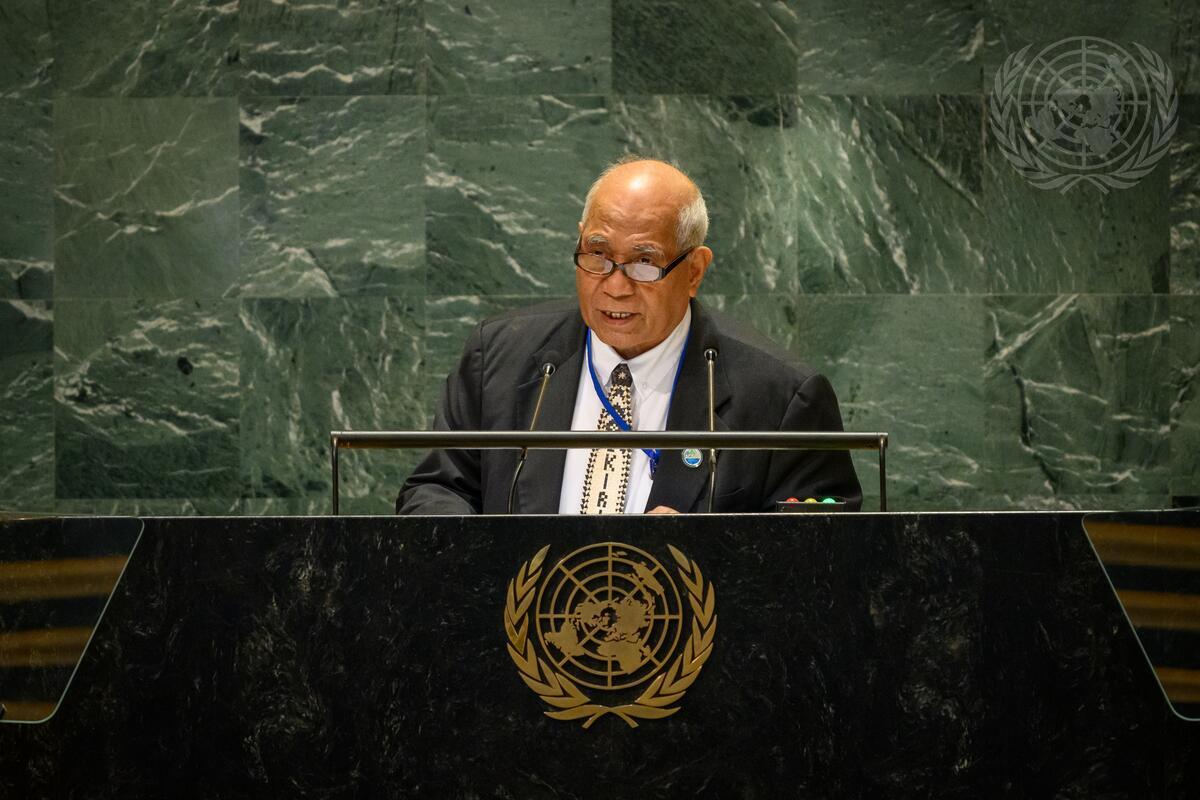Kiribati’s Permanent representative to the United Nations, Teburoro Tito, used the platform of the 79th Session of the UN General Assembly to call for urgent reform of the United Nations Security Council and emphasise the need for collective action in the face of global challenges.
Delivering his statement last week in New York, Tito marked Kiribati’s 25th year as a member of the UN with a bold call for unity and cooperation in dealing with threats ranging from climate change to international security.
“We joined this esteemed body a quarter-century ago with the belief that our challenges as a small island nation are tied to the global community’s fate,” Tito said. “As we celebrate this milestone, we reaffirm our commitment to the core principles of the United Nations—peace, justice, human rights, responsibility, and sustainable development.”
In his address, Tito highlighted the urgency of addressing global conflicts and crises, which have left millions displaced and marginalised.
He pointed to the UN’s theme for the session, “Leaving no one behind and acting together for peace, sustainable development, and human dignity,” as particularly relevant in today’s fractured world.
“The ongoing crises remind us that we, as leaders of 193 nations, must do whatever is necessary to get the world back on the path of peace, progress, and prosperity,” he urged. “Kiribati stands by this noble vision, recognising the urgent need for collective action to ensure no nation, especially the most vulnerable, is left behind.”
Tito did not shy away from the structural issues within the UN itself. He was direct in his critique of the current state of the UN Security Council, arguing that it is no longer fit to deal with modern global challenges.
He called for an expansion of the Council’s membership to include more inclusive and representative voices, particularly from Small Island Developing States (SIDS) and other vulnerable nations.
“It is critical that we reform the Security Council,” he said. “The Council was designed in 1945 by 51 founding members to maintain world peace, but its effectiveness is now severely compromised. The lack of unity, solidarity, and respect for the UN Charter is undermining its core mission.”
Tito stressed that without a reformed and reinvigorated Security Council, the UN’s ability to resolve conflicts and maintain peace would continue to falter. He also highlighted the need for a more engaged role by the UN Secretary-General and the P5 members of the Security Council in halting ongoing conflicts and preventing future ones.
Kiribati’s dedication to global peace was a key theme throughout Tito’s address, emphasising the country’s participation in peacekeeping missions.
He highlighted Kiribati’s ongoing support for the United Nations Peacekeeping Mission in South Sudan, marking the second time the nation has deployed personnel to contribute to international security efforts.
“We believe global peace can only be achieved through collective action,” Tito said. “Our Police Officers in South Sudan are a testament to our commitment, and we will continue to play our part in supporting UN peacekeeping missions.”
However, Tito was quick to point out that peace is a prerequisite for development. “A country without peace, devastated by war, cannot undertake any meaningful development,” he noted. “Development and human dignity are not achievable without peace.”
As a nation that has suffered from the devastating effects of nuclear testing, Kiribati has long been an advocate for nuclear disarmament. Tito reaffirmed Kiribati’s unwavering support for the Treaty on the Prohibition of Nuclear Weapons (TPNW).
“Our history with nuclear weapons has made our stance clear: the only path to global security is through complete nuclear disarmament,” he stated. “We stand in solidarity with other nations in advocating for a world free of nuclear weapons.”
Tito also highlighted the existential threat climate change poses to Kiribati and other low-lying Pacific nations.
He stressed the urgent need for global action to combat rising sea levels, which threaten the very survival of his country.
“Kiribati continues to grapple with the challenges posed by sea level rise, which endangers our land, agriculture, and way of life,” Tito said. “We call on the international community to maintain the 1.5-degree Celsius goal and address sea level rise as essential to safeguarding the livelihoods and sovereignty of Pacific Island communities.”
He urged that international commitments made in forums such as the COP meetings must be translated into concrete action, particularly for vulnerable nations like Kiribati that are disproportionately affected by climate change.
“Adaptation and resilience-building are critical for low-lying atoll nations like Kiribati,” he emphasised. “Coastal protection remains a priority, and we need urgent interventions in hard infrastructure like resilient seawalls.”
Tito also outlined Kiribati’s vision for sustainable development, rooted in the nation’s 20-year development roadmap, KV20.
He emphasised that Kiribati has localised the Sustainable Development Goals (SDGs) to fit its unique circumstances but stressed the need for global support.
“Sustainable development is crucial for the long-term resilience and prosperity of Kiribati,” Tito said. “We call for reform of global financial institutions to align with the development needs of small developing states like ours.”
He also expressed support for the Multidimensional Vulnerability Index (MVI), a proposed framework to more accurately assess the vulnerabilities faced by SIDS, and called on the international community to operationalize the MVI to unlock targeted support for nations like Kiribati.
Tito said Kiribati is committed to playing its part in global peace, security, and sustainable development, but the international community must step up to ensure that no one is left behind.
“As we approach the UN’s 80th anniversary, we must renew our unity and solidarity for the advancement of peace, sustainable development, and human dignity for present and future generations,” Tito said.














